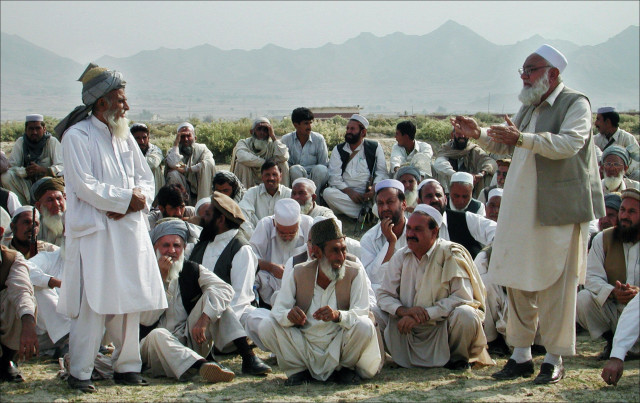Cost of conflict: Pro-govt tribal elders bear the brunt of target killings
Nearly 300 people lost their lives in K-P in last four years.

Nearly 300 people lost their lives in K-P in last four years. PHOTO: AFP/FILE
Around 283 people have been victims of target killings in Khyber-Pakhtunkhwa (K-P) in the past four years, with a large number of tribal elders among those slain, according to statistics of the police department.
Violence reached its peak in 2009 as target and sectarian killings claimed 137 lives. In 2010, 27 people were killed, while in 2011 the number shot up to 64. In 2012, 55 people were slain including five polio workers gunned down in Peshawar, Charsadda and Nowshera and six NGO workers killed in Swabi.
Most victims were pro-government tribal elders from Mohmand Agency, along with those killed in sectarian attacks on Shias.
A police official from Peshawar explained why the number of terrorist attacks and target killings dropped dramatically after 2009.
“They (militants) have killed almost the entire group of influential pro-government tribal elders, and the remaining are unwilling to provoke them. They wanted to create panic and keep people at a safe distance from Aman Lashkars (peace militias) and they are really successful in it.”
He added that militants had switched their attention from tribal elders to NGO and polio workers and last year a few officials of the Federal Investigation Agency and Intelligence Bureau were also killed. “Despite a drop in the number, let me say they are able to draw attention to their activities which put pressure on the provincial as well as the federal government.”
On May 11 last year, 72-year-old tribal elder Malik Dilawar Khan Mohmand from Jarobi Darra in Mohmand Agency was gunned down in Peshawar by unknown assailants on a motorcycle. Khan belonged to the Essa Khel Mohmand clan and was an ardent nationalist affiliated with the Awami National Party (ANP).
On March 25, 2012 another tribal elder of Mohmand Agency was killed along with three of his family members in the suburban area of Shero Jangi within the jurisdiction of Khazana police station.
Malik Jan Muhammad Mohmand, a Gur dealer settled in Toheedabad, Shero Jangi, was going to his office in Gur Mandi early morning when the vehicle he was in was ambushed by armed men.

Jan Muhammad was an activist of Jamaat-e-Islami and had also served as the president and general secretary of Gur Mandi’s Commission Agents Association.
Interestingly, most target killings took place within the jurisdiction of Khazana police station in the suburbs of Peshawar. Several tribesmen from Mohmand Agency are settled in the Bakshi Pul area and it was here in January 2010 that prominent elder Lal Bacha was gunned down along with two of his guards.
Yet another elder Malik Muhammad Saleem Khan was murdered near Tablighi Masjid in Peshawar in January 2011. The attack also left one his companions critically wounded.
A high-ranking police official admitted tribal ‘maliks’ or elders were being targeted by militants. “We know the local militants of Mohmand Agency are involved in it (the killings), but we are still unable to stop them.”
He added that tribal differences had turned Peshawar into a battle ground, with pro-government elders the most vulnerable targets.
Another soft target is elders from the Shia community. So far, at least a dozen prominent Shia leaders have lost their lives along with a few Sunni leaders.
In December 2012, militants targeted five polio workers in the suburbs of the provincial capital, Charsadda and Nowshera. The province hadn’t fully come to terms with the brutal killings when another six female NGO workers were slain in Swabi district on the first day of January.
Published in The Express Tribune, January 6th, 2013.













COMMENTS
Comments are moderated and generally will be posted if they are on-topic and not abusive.
For more information, please see our Comments FAQ